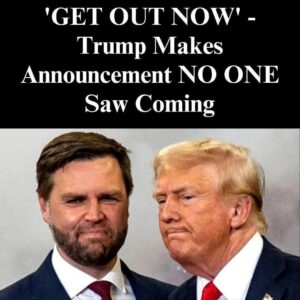A Controversial Sermon: Bishop’s Message Sparks National Conversation
At a recent prayer service held at the Washington National Cathedral, Bishop Mariann Edgar Budde delivered a sermon that drew unexpected national attention. With prominent political figures, including President Donald Trump and Vice President JD Vance in attendance, her words quickly became a focal point of public debate.
During her address, Bishop Budde urged the nation’s leaders to act with compassion toward vulnerable communities, including immigrants and members of the LGBTQ community. Her plea, framed in spiritual and humanitarian terms, called on leadership to “have mercy” and consider the everyday struggles of people often overlooked in policy discussions.
“The people who pick our crops, clean our buildings, and care for our communities may not all have legal documentation,” she said. “But they are part of the fabric of this nation.”
The sermon struck an emotional chord with some listeners, while others viewed it as unusually direct for the setting. Observers noted that the tone of her message felt more pointed than pastoral, with the bishop speaking directly to the president at several moments.
Reactions from the audience, including President Trump and Vice President Vance, appeared muted. Some brief expressions caught on camera hinted at discomfort, though neither commented publicly during the event.
Later, in an interview with CNN, Bishop Budde explained her motivation. “These are not abstract issues to me,” she said. “These are people I know. They work in our communities and deserve to be seen and acknowledged.”
She emphasized that her intention was not to criticize, but to remind those in power of their shared responsibility. “I was speaking from the heart — as any pastor would — on behalf of people who are often unheard,” she added.
Budde clarified that her message was rooted in her faith and pastoral duty, rather than political opposition. “I believe faith calls us to see one another with compassion, regardless of our circumstances,” she said.
Still, the sermon sparked widespread discussion online. Some praised her courage to speak on moral grounds; others felt the platform was not appropriate for such a pointed appeal. Debate also surfaced around the broader role of religious leaders in addressing political or social matters during ceremonial events.
Though the bishop’s comments were divisive, they raised deeper questions about the role of faith in public discourse — especially at high-profile national events.
Adding to the public scrutiny, financial records revealed that Bishop Budde previously made small political donations during past election cycles. Though legal and relatively minor, the disclosure reignited conversations around the intersection of religious leadership and civic activism.
In response to the speech, President Trump later posted on social media, expressing frustration with what he perceived as a politicized tone during a sacred event. His message criticized the content and delivery of the sermon but did not go into specifics about its impact on future relations.
Despite the public criticism, Bishop Budde has not backed down from her remarks. She maintains that the purpose of her sermon was not political, but personal and pastoral — reflecting both her beliefs and the stories of people in her life and community.
“I know these people,” she told CNN. “They’re not numbers or headlines to me. They’re neighbors, workers, caregivers — and I spoke with them in mind.”
Her son, Amos, is also known for his work in advocacy and organizing. While some have highlighted their shared interest in social causes, the bishop made clear that her message came from her own experiences and responsibilities as a religious leader.
As the dust settles, the moment remains a reminder of how complex and sensitive the overlap between faith, leadership, and public service can be. Whether seen as courageous or controversial, Bishop Budde’s sermon sparked a larger conversation — one that is likely to continue as leaders navigate the responsibilities of power and the expectations of the people they serve.




